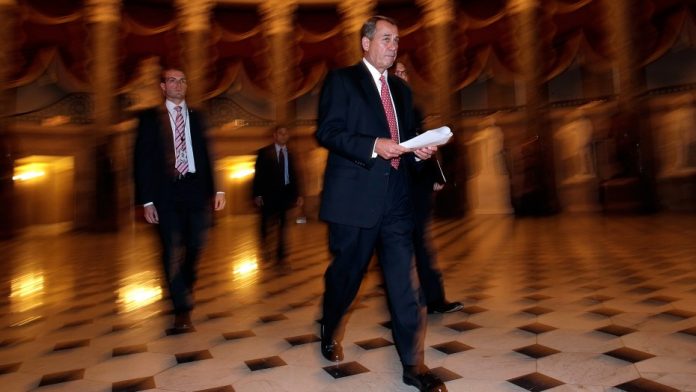
The speaker’s looking to test the waters ahead of primaries, and he’ll score a political win no matter how it turns out.
The speaker’s looking to test the waters ahead of primaries, and he’ll score a political win no matter how it turns out.
(Photo by Win McNamee/Getty Images)

John Boehner is planning to unveil a set of Republican principles for immigration reform before President Obama’s State of the Union address, aiming to show the GOP is not hostile to legislation that might win them Hispanic voters.
According to House leadership and immigration-policy aides, the principles will be broad, nebulous even, and heavily focused on Republicans’ favorite immigration issue—border security. It will not include any concrete proposal, they said. Indeed, the wording is likely to be intentionally squishy, giving lawmakers lots of room to maneuver.
But no matter what happens, Boehner will come out a winner just for the effort. If it flops over hardliners’ objections to anything that approaches amnesty for illegal immigrants, Boehner and Republican campaign leaders looking for cash can still tell the business community they tried. What’s more, it could lay the groundwork for a Republican overture to Hispanic voters, a group everyone sees as critical to winning in 2016.
“We can win in 2014 without resolving it. We can’t win in 2016 without resolving it,” said Senate Minority Whip John Cornyn, R-Texas.
Majority Leader Eric Cantor, Majority Whip Kevin McCarthy, Republican Conference Chairwoman Cathy McMorris Rodgers, and immigration-law expert Bob Goodlatte, chairman of the House Judiciary Committee, are writing the principles with Boehner.
They intend to start vetting them with House Republicans, likely next week after GOP leaders hold a meeting to prep for their conference’s Jan. 29 retreat. By the time the principles go public (or are leaked), leadership hopes to have more than half of the conference on board.
Then, according to aides, the plan is to gauge public reaction. If House members are deluged with nothing but hate mail from their districts, Republicans might decide to do nothing but emphasize border security, perhaps even voting on the border bill produced last year. That’s at least until 2014 primary-election filings are over. (The biggest threat to Republicans on immigration is in the primaries anyway, strategists say. No one will lose in the general election because they are too soft on immigration.)
But if leadership’s principles receive some positive feedback, Goodlatte, Cantor, and Rep. Darrell Issa, R-Calif., could advance legislation they have discussed for the last several months. As yet, there is no legislative language drafted, however. Cantor and Goodlatte have talked about a path to citizenship for undocumented “dreamers” who came to this country as kids. Even Rep. Joe Heck, R-Nev., is discussing some sort of “Dream Act.” Issa is mulling broader legalization for other unauthorized immigrants. Rep. Mario Diaz-Balart, R-Fla., is trying to gather support for a legalization plan that would allow undocumented immigrants to get green cards through normal channels, such as children or spouses.
“That’s at least five and maybe six or seven House Republicans getting ready to introduce legalization bills. House Republicans competing to write bills for what they once called amnesty. I think that’s pretty dramatic, as I understand from the outside,” said ImmigrationWorks USA President Tamar Jacoby, a Republican advocate for immigration reform who is familiar with the House strategy.
Jacoby likens the “piecemeal” approach to immigration reform to the seven courses of a Thanksgiving dinner—all the pieces add up to a voluminous whole. “Everything will get done fairly quickly over a few days or weeks,” she said. “In leadership’s conception, the pieces address pretty much all the major issues.”
Cantor told his caucus in a memo at the beginning of the year that immigration could be one of the topics that make it to the House floor “over the next few months.”
The odds remain low for the House to advance legislation that might win lots of Democratic support, although some lawmakers, such as Rep. Luis Gutierrez, D-Ill., will probably applaud the effort and encourage the negotiations to continue. And House Republicans will certainly face opposition from conservatives like Rep. Steve King, R-Iowa, who disapprove of any action on immigration while President Obama is in the White House.
What Boehner is hoping for, however, is that a majority of the GOP conference—the middle-of-the-road folks who listen to their local chambers of commerce and sympathize with the need to court Latinos—will have a different view than King and other hardliners.
And if they do, they could win sizable concessions from liberals to change the immigration system. They could dramatically bolster border and worksite enforcement and rein in the current family-based “chain migration” system.
It would also be a huge win for Boehner. He could rightly state that he found a politically plausible answer to the most difficult public-policy question facing Congress. He could dismiss criticisms that he is more bluster than substance. And the proposal, whatever it is, would put conservatives in the driver’s seat in negotiations with the White House. It would be awfully hard for President Obama to have an immigration solution in hand and reject it.
This article appears in the January 15, 2014, edition of NJ Daily.
http://www.nationaljournal.com/congress/inside-boehner-s-election-year-immigration-strategy-20140114











